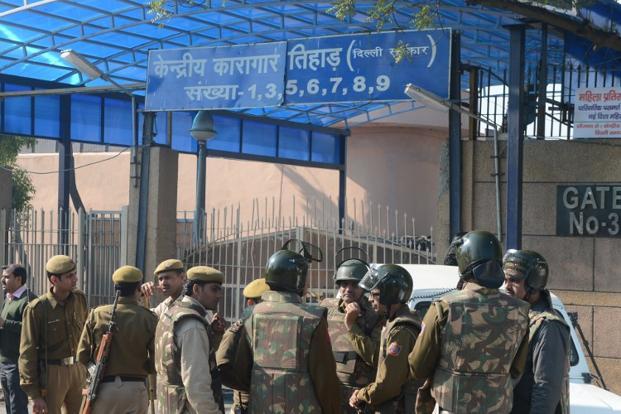
Prison officials said on condition of anonymity that Mukesh Singh (32), Pawan Kumar Gupta (25), Akshay Thakur (31) and Vinay Sharma (26), who were moved on January 16 to Tihar’s Jail No 3, where the death sentence will be carried out, are on “suicide watch” the likes of which Tihar has never seen before.
The most guarded men in India’s largest prison, which houses over 18,000 inmates, are not Mumbai underworld gangster Chhota Rajan, Delhi’s biggest don Neeraj Bawana, or Bihar’s strongman turned politician Mohammad Shahabuddin; they are the four convicts of the December 16 gang rape and murder case, who are due to be hanged on February 1 according to the latest court directive.
Prison officials said on condition of anonymity that Mukesh Singh (32), Pawan Kumar Gupta (25), Akshay Thakur (31) and Vinay Sharma (26), who were moved on January 16 to Tihar’s Jail No 3, where the death sentence will be carried out, are on “suicide watch” the likes of which Tihar has never seen before.
The four prisoners are lodged separately in single cells in a section of the prison’s “high-risk” ward. The living space, about six feet by eight feet, has an open front guarded by prison bars; there are no iron railings or beams overhead; no part of the cell can be covered with any cloth; for each cell, there are two guards on duty round-the-clock; and even when the prisoners use the attached toilet, their heads are visible from above a small stone partition.
The cells are checked twice every day for any prohibited item that may have been sneaked in. In addition, each cell has two CCTV cameras — and the live feed is monitored round-the-clock from a control room in the jail superintendent’s office, and an office in the prison headquarters.
Before the four men were moved to these cells, the guards checked that there was no loose nail in the wall or any loose pieces of metal that could be used to hurt oneself.
“The only way in which these prisoners can hurt themselves is by banging their heads against the wall. This is common method adopted by prisoners to frame the other prisoners, jail officers or postpone their hanging. In their case, even if they do this, the guards can open the cell’s lock within seconds and stop them,” said a senior prison officer, who asked not to be named.
What has prompted this unprecedented level of security, said a second jail official, is that the fifth accused in the case, Ram Singh, was found hanging in the bathroom of the general ward of Jail No 3 on March 11, 2013 in one of the most high-profile incidents of a prison death in India. “This case is different. Even if one of them takes their life, it is going to cost jobs at the highest level. It won’t be wrong to say that the case is politically important for everyone,” the second officer added.
Apart from the heightened security, the four are being medically examined by a prison doctor every day. A third prison officer, who did not wish to be named, said, the four men are examined once a day and a report is sent to the prison headquarters.
“Their weight and physical condition is noted. It is part of a report that has to be prepared once a day. Except Pawan, the others have not displayed signs of anxiety. Maybe they believe that the hanging will be postponed again. Pawan sometimes refuses to eat,” the third officer said.
Prison expert Sunil Gupta, who was Tihar’s law officer for over three decades until his retirement in 2015, said that prisoners on death row are extremely vulnerable. “I have supervised eight hangings. The security of the four men is very important. They may try hurting themselves so that the prison officers are accused of violence and the hanging is postponed again. At the same time, the four should also be counselled by religious leaders too. We used to do it,” he said.
The second officer said that the men are indeed being counselled.
The four are on death row for the gang rape and brutal assault of a 23-year-old physiotherapy student inside a moving bus on December 16, 2012. The young woman died in a hospital in Singapore on December 29.